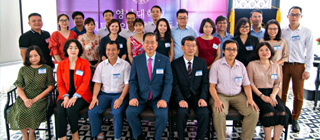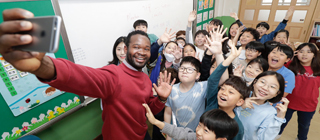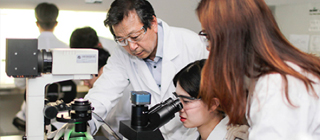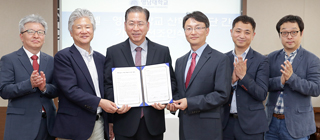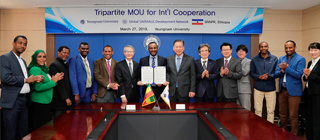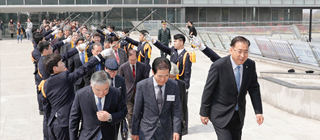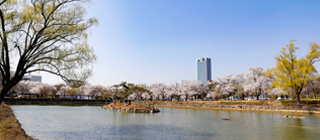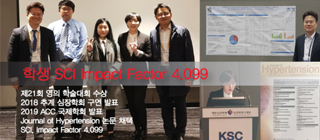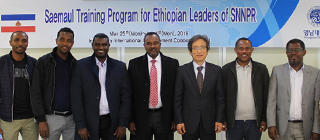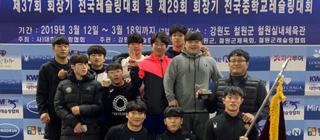-
‘Vietnamese YU Alumni Association’ held in Hanoi, Vietnam Active in various sectors of Vietnam including college professors, public employees, and in national institutes and global companies Participants donate funds to use for college development [April 29, 2019] In the afternoon of the 27th despite being a weekend, over 30 Vietnamese YU alumni working in different sectors in Vietnam gathered at the La Siesta Hotel in Hanoi. They took time out from their busy schedules to attend the ‘Vietnamese YU Alumni Association’. They are leading the development of Vietnam in various fields such as public employees in central and local governments of Vietnam, college professors, major national institutes and public corporations, and companies like LG. At the alumni meeting, key university figures including YU President Sur Gil-soo and External Affairs Cooperation Office Director Park Jae-hong were in attendance. Mr. Sur said in his congratulatory address, “YU alumni are doing tremendous things all around the world. Coming to Hanoi, the heart of Vietnam, I can really feel the power of YU alumni in Vietnam.” He added, “There are over 600 international students from Vietnam studying hard at YU. I believe that they will become leaders of Vietnam in the near future, just like their seniors present here today. I hope that the YU alumni association will become the central point as leaders of not only Vietnam, but the world.” At this alumni meeting, Vu Dang Toan (43) was elected as the second alumni association chairperson following Huynh Sang (64, former professor of Korean language at Van Hien University) who served as the first alumni chairperson since 2011. Mr. Vu Dang Toan earned his PhD at the YU Graduate School of Biomedical Engineering and is currently employed at the Vietnam Agricultural Science Institute. Chairman Vu Dang Toan said, “Becoming the second chairman instead of my seniors here who are highly active in Vietnam feels like a big burden. I will do my best to lead the Vietnam alumni association.” He added, “I will do my best so that it does not simply become a meeting of alumni in Vietnam, but will continue to interact with the alma mater and make close times among YU alumni.” <Dr. Vu Dang Toan (right) who was elected as the second alumni association chairman of the ‘Vietnamese YU Alumni Association’ delivers development funds to YU President Sur Gil-soo (left).> At this alumni meeting, the participating alumni gathered college development funds on site. They donated the funds to Mr. Sur Gil-soo and promised to meet again next year with more alumni. YU is planning to use the development funds to promote international student alumni associations and as scholarship funds to help with the academic progress of international students from Vietnam at YU.
-
Gyeongsangbuk-do Office of Education Research Institute operates global culture understanding education program with the Daegu Metropolitan Office of Education Korean and foreign student team serve as one-day teachers at local elementary, middle and high schools Popular for unique classes such as experiencing culture, language and traditional outfits of countries around the world [May 7, 2019] Students could be heard exploding in laughter at a classroom at Jeongpyeong Elementary School during the third period on the morning of the April 30. Chimereze Eden (26), a senior in international development and Saemaul Undong from Gabon currently studying at YU, and Kim Re-ah (22) majoring in sports science at YU became one-day teachers at an elementary school. They taught a class on the theme of understanding Gabon culture. Chimereze Eden introduced the students about Gabon and talked about the language and foods of Gabon, while Kim Re-ah provided support such as materials needed for class. Students reacted very favorably to the unique class taught by a foreign college student. In particular, the elementary students were charmed by foreign cultures by experiencing the traditional outfits of Gabon. Chimereze Eden said, “It felt great being given the opportunity to introduce the cultures of Gabon to Korean students. It was a lot of fun because I was able to interact with students at an elementary school classroom of Korea.” Kim Re-ah, who also helped teach students, said, “We carefully prepared materials to help explain in class, but once I got ready for class, I became worried. But, as soon as class started, the students reacted very well so we were able to have a fun class.” Mr. Park Myeong-chan (48), a teacher at Jeongpyeong Elementary School, said, “It was great to see the students participate eagerly on global understanding education throughout the entire class. I think the students participated actively throughout the entire class because it was a new class format being able to learn about the culture of an unfamiliar country from a native college student.” He added, “The college students who came as one-day teachers prepared for class so well that they were able to stimulate curiosity among students. I wish there were more opportunities like this for students.” The class that they held was part of the ‘2019 Foreigner Invitation Global Understanding Education’ hosted by the Gyeongsangbuk-do Office of Education Research Institute. Through this program, local elementary, middle and high school students can communicate naturally with foreign college students to experience cultures from around the world and was planned out by the Gyeongsangbuk-do Office of Education Research Institute to help students gain a global outlook. This education session conducted by a team of one international student and one Korean student is joined by 82 teams from 32 countries including Gabon, Ghana and China studying at YU. A total of more than 80 classes will be held until November in 16 elementary, middle and high schools such as Jeongpyeong Elementary School, Sadong High School, Gunwi Bugye Middle School, and other schools in the Gyeongsan, Cheongdo, Yeongcheon and Gunwi regions. Meanwhile, YU has been operating ‘Global Harmony for the Future’ for global knowledge sharing volunteer work together with the Daegu Metropolitan Office of Education since the second semester of last year. As part of the liberal grade system, seven teams made up of YU students and international students from sister schools in the Netherlands, Chile, Brazil and China participated in the second semester of last year to joint the creative experience activity classes and its program for communicating with popular culture such as music from different countries. They worked on global cultural communication in six middle schools in the Suseong-gu region of Daegu including Gosan Middle School, Daegu-dong Middle School, Maeho Middle School, Soseon Girls’ Middle School, Shiji Middle School and Shinmyung Middle School three times a semester. In this semester, exchange students from sister schools in seven different countries such as the USA, China, Germany, India, Bulgaria, Taiwan and Turkey will team up with Korean students to make a total of 15 teams to provide global knowledge sharing volunteer activities at four middle schools in the Buk-gu region of Daegu such as Gangbuk Middle School, Dongbyeon Middle School, Unam Middle School and Chilgok Middle School. Regarding this, YU External Affairs Cooperation Office Director Heo Chang-deok said, “There are currently about 1,700 foreign students from over 60 countries working on their diplomas at YU and about 300 exchange students from sister schools from 20 countries come to study as well. In other worlds, it is a global campus university with over 2,000 foreign students studying here every year.” He added with emphasis, “Using the global education basis of YU, we will further promote various cooperation programs to share with the local communities.”
-
Best university in biopharmaceuticals in the ‘2018 College Rankings by Industries’ Participated by employees of 43 companies such as Yuhan Corporation, evaluating 1,024 corporate surveys [May 2, 2019] ‘What is the best university chosen by companies?’ YU (President Sur Gil-soo) was selected as the ‘best university’ by the industry. On April 24, the Ministry of Education and the Korean Council for University Education (KCUE) announced the ‘2018 College Rankings by Industries’. In result, the YU Department of Biotechnology was recognized for its outstanding educational course by being selected as the ‘best university’ in the biopharmaceutical sector. A total of 22 universities and 24 departments were selected as best college/department in five fields such as biopharmaceuticals, environment, energy, biomedical instruments, advertisements, etc. In detail, nine schools were selected for biopharmaceuticals, nine in environment, one in energy, two in biopharmaceutical instruments, and three in advertisement. The ‘College Rankings by Industries’ that have been conducted since 2008 together by the Ministry of Education, KCUE and economic organizations evaluate universities based on the perspective of businesses. College Rankings by Industries evaluate whether the capacities of college graduates fit the capacities of personnel needed by the industry and proposes core competencies per field by the industry and the relevant curricula to evaluate the level of conformity of college education courses. Employees from a total of 43 companies such as Yuhan Corporation, LSIS, Coway Entech, Osstem Implant and MBN Media Lab participated in the evaluation, while 1,024 companies joined in on the surveys. The YU Department of Biotechnology that received the highest rating has been graduating talented and practical human resources for the bio industry through practical major education reflecting industry needs, on-site education linked to acclaimed domestic research centers and businesses, and internationalization education linked with overseas sister schools. In particular, it focuses on improving the core capacities of students through lab work in industries, operating Capstone Design courses, inviting CEOs and experts to give lectures, study groups for in-depth studies in majors, and lifelong teaching-learning programs, etc. <YU Department of Biotechnology lab class> Universities selected as best universities in this ranking will receive certification plaques under the name of the Ministry of Education, 5 economic organizations, and KCUE. The five economic organizations are planning to recommend giving employment incentives to graduates of the best universities to its member companies. Meanwhile, YU was selected as the best university in the 2017 College Rankings by Industries in the petrochemical sectors, in the construction sector in 2016, and in the metals and foods sector in 2015. In 2014, YU was selected as the best university in the biopharmaceutical sector, electronic semiconductor and IT sector in 2013 and architecture in 2012.
-
Technology developed by YU Department of Medical Biotechnology Professor Choi In-ho (Cell Culture Research Center Chief) signs agreement for technology transfer with Ecell Commercialization expected to expand to the cell culture market and cosmeceutical market Technology transfer fee ‘1 billion KRW + 2% of sales’ [April 23, 2019] <From left to right, YU Department of Medical Biotechnology Professor Choi In-ho, Industry-Academic Cooperation Cooperation Team Leader Park Yong-wan, President Sur Gil-soo, Ecell CEO Kim Doo-hyun) Outstanding technologies possessed by YU (President Sur Gil-soo) will be transferred and commercialized to businesses. At 1:30 p.m. on the 22nd (Mon), YU signed a technology transfer agreement with Ecell (CEO Kim Doo-hyun). The technologies that were transferred are ‘New Peptide FNIN2 that Promotes Cell Proliferation and Splitting and Its Use) and ’New Peptide FNIN3 that Promotes Cell Adhesion, Proliferation and Splitting and Its Use’ developed by YU Department of Medical Biotechnology Professor Choi In-ho. The technologies subject to the technology transfer can be used in various fields such as the stem cell culture solution (medium) market, cosmeceutical market including cosmetic products having stem cell medium, and the stem cell treatment market, and therefore, it is expected to create a new market together with the rise of the anti-aging industry for the aging society. Technologies for developing new drugs and materials using advanced IT technologies in the bio sector have recently been on a stark rise mainly in advanced countries. Professor Choi’s research team successfully developed peptides specialized in stem cell treatment using ‘Insilico’ analysis technologies used for bio phenomena and pharmaceutical product research through big data information and computer simulation on protein structures that exist in the cell barrier. It is expected that through this, production efficiency of bio pharmaceutical products specialized for stem cell treatment substances will increase. YU signed a 1 billion KRW contract for technology transfer fees of this technology and it will also receive 2% of all sales from the business of the company for three years. Ecell is a company that manufactures products related to disposal cell culture processes and with this technology transfer, it is planning to transfer its head office or split its company and open a new location in Uiseong-gun, Gyeongsangbuk-do. YU President Sur Gil-soo said, “Technologies and research capacities of YU are being sought after by many companies.” He added, “YU will take the initiative to create new growth engines for not only YU and businesses, but also for the local community through continued industry-academic cooperation.” YU Industry-Academic Cooperation Team Leader Park Yong-wan said, “As it takes a long time for bio technologies to become commercialized, the industry-academic team will do its best to improve the possibilities to commercialize technologies through flexible ties between the industry-academic cooperation team and businesses.” Ecell teamed up with the YU Technology Transfer Commercialization Center for the inter-collegiate convergence commercialization project (supervised by Chonnam National University) of the Ministry of Education’s (National Research Foundation) Beyond Research Innovation & Development for Good Enterprises + (BRIDGE+) to receive funding for commercialization and has been pursuing technology commercialization. This technology is the result of research on Gyeongsangbuk-do’s ‘4th Industrial Revolution Core Technology Development Project’ (overseen by the department of science policy, 3 years, 800 million KRW) and under the leadership of YU Department of Medical Biotechnology Professor Choi In-ho (Cell Culture Research Center Chief), it was joined by College of Pharmacy Professor Jung Ji-heon and College of Medicine Professor Doh Gyeong-ho. Professor Choi’s research team has focused on developing treatment related to muscles and commercializing cell culturing technologies through research on muscle stem cells for over 10 years.
-
‘YU-GSDN-Ethiopia SNNPR’ Saemaul Development Cooperation MOU signed GSDN Chairman (YU Professor) Choi Wae-chul reappointed as policy advisor for SNNPR, Ethiopia Governor of SNNPR requests YU for support to establish ‘Department of Saemaul Economic Development’ in local university [April 8, 2019] <The three institutes of YU, GSDN and SNNPR, Ethiopia signed an MOU for Semaul community development.> The wind of Saemaul development is brewing into a storm in Ethiopia. Senior government officials and major policy legislators led by the governor of the Southern Nations, Nationalities, and People’s Region (SNNPR) of Ethiopia are actively looking to learn the Saemaul Undong. YU (President Sur Gil-soo) teamed up with the Global Saemaul Development Network (GSDN, Chairman Choi Wae-chul) to create a wind for Saemaul development in SNNPR, Ethiopia. On March 27, YU, GSDN and SNNPR, Ethiopia met at the main conference room of YU to sign an MOU for Saemaul development. They gathered to pursue policies to promote local development of SNNPR and promote the quality of life of its residents, and in particular, to pursue community development programs based on Saemaul development policies. SNNPR, Ethiopia is a large state that spans over an area of 106,000 square kilometers, which is larger than Korea, and has a population of 19 million. The ‘Global Saemaul Development Network (GSDN)’ is a cooperative body and non-government international organization that shares the Saemaul Undong and Saemaul development policies with developing countries, and it is made up of 458 individual and institutional members in 61 countries, and it is chaired by YU Department of Saemaul and International Development Professor Choi Wae-chul. SNNPR Governor Million Mathewos of SNNPR and other senior government officials visited YU to sign this MOU and also participated in a Saemaul Undong policy training hosted by the YU International Development and Cooperation Center over a period of seven nights and eight days. Governor Million’s delegation learned about the philosophy and drive of Saemaul development, experience cases of the Saemaul Undong, and drafted execution plans to implement this in SNNPR. In particular, Director of Agriculture Tilahun Kebede Wolde who participated in this training had already participated in the Saemaul development policy training program in 2015, and still showed great passion by recording every detail of the education provided. Prior to signing the MOU, on March 26 SNNPR Governor Million expressed his appreciation to GSDN Chairman Choi Wae-chul for his role as an advisor for SNNPR local development, and handed a certificate of appointment as the SNNPR policy advisor while requesting that he would continue to help as the state government’s policy advisor (photo on right). Chairman Choi led Saemaul Undong education for public officials in Ethiopia in February of 2016 and at the time, he was requested to take the position of an advisor for the state government from SNNPR Governor Dessie Dalkie Dukamo, which he had accepted. On this date, Governor Million said, “We are planning to implement local development programs and the Saemaul Undong full-fledged for the development of the community and to improve the quality of life for its residents,” and added, “We wish to continue to learn the wisdom and experience of the Saemaul Undong through the cooperation and support of YU and GSDN.” He also requested support for the installation of the ‘Department of Saemaul Economic Development’ in a local university of SNNPR to foster new talented human resources. Chairman Choi Wae-chul responded, “Ethiopia is our brother country that put their lives on the line when we were in trouble,” and added, “If Korea’s experience and especially the experience of Saemaul development can help with the local development of SNNPR, I will do my best to help.”
-
Eighth ‘homecoming day’ since 2011... Over 100 alumni in Seoul visit their alma mater in buses ‘Talk concert’ of senior and junior alumni, Seoul Cheonma Choir made up of alumni living in Seoul perform to receive huge response Chairman of the Seoul Alumni Association Yoo Gun-ha and Bolim Construction CEO Kim Seok-hoe donates development fund [April 5, 2019] <YU alumni from Seoul visiting alma mater welcomed by juniors at YU> “I was so excited to meet my juniors at YU that I had a hard time going to sleep for the past few days. Though my body has left YU after graduating, I always cherish my memories of my alma mater. Please remember that your seniors all across Korea are always rooting for YU and our juniors!” At noon on the first week Friday of April with cherry blossoms in full bloom at the campus, over 100 alumni in Seoul visited YU including YU Seoul Alumni Association Chairman Yoo Gun-ha (‘66, Architecture class of ’71, Kunwon Engineering CEO). They are all leaders of Korea in various fields. <2019 Seoul Alumni Association Homecoming Event> Only at YU can you see over 100 alumni who are leaders in different parts of society to come together simultaneously despite their busy schedules to ride buses and travel for four hours to visit their alma mater. This rare homecoming day event is already in its eighth year since 2011. Former Minister of Health and Welfare Jeon Jae-hee (Public Administration ‘68), Bolim Construction CEO Kim Seok-hoe (Architecture ’75), A Plus Asset Group Chairman Kwak Geun-ho (Chemical Engineering ‘76), Former President of the Korea Minting and Security Printing Corporation Kim Hwa-dong (Law ’76), National Assemblyman Joo Ho-young (Law ‘78)_, KOTFA CEO Park Gang-seop (Law ’80), Former Head Coach of the Korean National Football Team Shin Tae-yong (Sports Education ‘88) and other leaders in finances, law, cultures and sports gathered on this special day. YU Seoul Alumni Association Yoo Gun-ha, who prepared for this event, said in his welcoming address, “The homecoming day of seniors who are actively leading various sectors of society is already in its eighth year. This meeting will help instill a love for school for alumni and a valuable opportunity for students to think about their future and directions they should take through the experiences of seniors. I hope that this event will be a turning point for our juniors to be able to grow further.” YU prepared a welcoming event and luncheon for the alumni who took out their time to visit, while YU President Sur Gil-soo, professors and the student body president attended to show their appreciation. Also, upon hearing news that alumni living in seoul are visiting YU, YU General Alumni Association Chairman Jung Tae-il (Mechanics ‘64) and other alumni association officers visited YU to welcome them. YU President Sur Gil-soo said, “Students should feel a strong sense of support thanks to their seniors who love YU and their juniors,” and added, “I hope that this event will serve as an opportunity for alumni and students to share their challenging spirits and valuable experiences. I ask that the senior alumni will become excellent mentors for their juniors.” Student body president Jung Hwan-do (25, School of Chemical Engineering, senior) gave welcome flowers to Seoul Alumni Association Chairman Yoo Gun-ha on behalf of the students of YU and said, “We are very thankful to our seniors who come to YU every year. We will also work hard to follow in the footsteps of our seniors.” The alumni living in Seoul also donated a development fund to YU at this event. Seoul Alumni Association Chairman Yoo Gun-ha donated 20 million won and Bolim Construction CEO Kim Seok-hoe donated 10 million won asking YU President Sur Gil-soo to use the money for the school and students.“ Following the luncheon, a ‘talk concert’ was held with junior students at the Cheonma Art Center Chamber Hall from 2:30 p.m. The talk concert, which was hosted by former Korea Minting and Security Printing Corporation President Kim Hwa-dong was held with a special lecture by A Plus Asset Group Chairman Kwak Geun-ho (right on photo) with Bolim Construction CEO Kim Seok-hoe, KOTFA President Park Gang-seop and former Korean National Football Team Head Coach Shin Tae-yong as panels. The 500 capacity Chamber Hall was filled with junior students who came to listen to the valuable experiences and advice of seniors, while focusing on each and every word they had to say. Also, the Seoul Cheonma Choir made up of the Seoul Alumni Association performed in the middle of the talk concert, receiving huge applause by students.
-
New resting areas such as Solseom, Love Rock and outdoor performance hall In addition to the YU Cherry Blossom Path, Love Road and Folk Village, perfect for spring-chasers Kimin Electronics CEO and alumni of the YU School of Chemical Engineering contributed lighting worth 10 million won [April 9, 2019] <YU Mirror Pond> In the spring season of April, the YU Mirror Pond, which is a popular spring destination, completed its makeover. The YU Mirror Pond is an artificially made pond with a size of 99m x 50m and it was first built as a fish farm where 10,000 carps lived in 1974. It was given its name ‘Mirror Pond’ through a naming contest in 1979. Its name was given because it projects the weeping wills around the YU Central Library and as a place for members of the university to take time to reflect on themselves. In 1995, it was newly designed to its current form by YU Department of Landscaping Professor Park Chan-yong (currently honorary professor at YU) based on the idea of ‘round skies and square land’ of geomancy that says that the skies, earth and people live in harmony. <YU Mirror Pond with Night Lights> From September of last year to March of this year, YU conducted environmental improvement and island-making projects to restore the original scenery of the Mirror Pond, removing the cattail and waterproofing the floors, as well as building a underwater flower bed. ‘Solseom’ (Pine Island) that was built in the middle of the Mirror Pond is spotted with weeping cherry, pine trees, azalea, and red apricot flowers, and lighting was installed to light up the nights, making the Mirror Pond even more beautiful. There is also a stage to enjoy outdoor performances such as busking around the Mirror Pond and the Love Rock was newly erected and is expected to become a coin-tossing attraction. <Mirror Pond Environmental Improvement and Solseom Construction Commencement Ceremony> YU President Sur Gil-soo said, “Another place of rest was built at YU, which is already famous for its cherry blossoms in the area. We hope that it will be a place for not only students and faculty, but also community members to enjoy the spring in April and take time to relax.” The new Mirror Pond and the cherry blossoms along the Cheonmadaero in front of the main building of YU, Love Road and the path to the Folk Village will become a new landmark of YU. Meanwhile, Kimin Electronics CEO Lee Tae-young (right on photo) who is an alumnus of the YU School of Chemical Engineering contributed 10 million won worth of lights and the project was carried out with no additional expenses and only the equipment and personnel of YU.
-
College of Medicine seniors Kim Jung-ri, Seon Woo-chan, Park Jung-bin and Advisor Lee Jung-hee (Internal Medicine) Published paper in internationally acclaimed journal in the circulatory system internal medicine sector Fruit of the ‘Youngui Student Scholastic Contest’ hosted by the College of Medicine... Training research capacities from undergraduate studies [April 11, 2019] YU College of Medicine undergraduates published a research paper in an internationally acclaimed journal as the primary author. The authors of the paper are College of Medicine seniors Kim Jung-ri, Seon Woo-chan, and Park Jung-bin (Advisor, Internal Medicine Lab Lee Jung-hee). The paper they published is on the research results of ‘long-term clinical outcomes according to the mean observed blood pressure in patients with coronary artery disease after drug-eluting stent implantation’. This study was published in the <Journal of Hypertension, impact factor=4.099>. This journal has international prominence in the circulatory system and internal medicine sector and this feat was significant in that it was a paper researched mainly by undergraduate students. This paper was on a study to participate in the Youngui Student Scholastic Contest hosted by the YU College of Medicine and it was also presented in the 2018 Fall Korean Society of Cardiology and the 2019 ACC (American College of Cardiology) international conference. College of Medicine Internal Medicine Lab Professor Lee Jung-hee, who advised the students, said, “These research results are very significant in that it was the outcome of the Youngui Scholastic Contest, which is a student research support program of the YU College of Medicine, that is being carried out annually by procuring a budget for over 10 years with the goal of fostering competent medical scientists.”
-
The YU International Development Cooperation Center hosts Saemaul development training for ‘SNNPR, Ethiopia’ Governor’s delegation New governor strongly requested ‘Saemaul development’ training... 2nd training team to receive education in May Ethiopia Saemaul Undong policy training selected as ‘best’ global education training case by KOICA [April 1, 2019] <Training team from the SNNPR (Southern Nations, Nationalities and People’s Region), Ethiopia who participated in the YU Saemaul development policy training> YU (President Sur Gil-soo) is helping SNNPR, Ethiopia reach regional development through policy training education by applying Saemaul development. The governor and other leaders of SNNPR, Ethiopia participated in the Saemaul development policy training held by the YU International Development Cooperation Center (Director Park Seung-woo) from March 25 to April 1. This training was held at the request of the newly appointed governor of SNNPR, Million Mathewos. SNNPR is one of the nine provinces of Ethiopia and it is a large self-governing province with a population of approximately 19 million. This is not the first time that there was exchange and cooperation between YU and SNNPR. SNNPR also completed a Saemaul education research program back in January and February of 2015 when the former governor was in office. At the time, the research team was very assertive and participated in the training by procuring financial resources on their own despite their weak financial conditions. In the education and training held on two separate occasions on an eight-day schedule, 23 people (11 in 1st and 12 in 2nd) including the governor and vice-governor received training. Also, in February of 2016, professors of YU led by Professor Choi Wae-chul of the YU Department of Saemaul and International Development went to SNNPR to offer the Saemaul Undong policy training program. This program has reaped clear success being selected as a best case in the global education and training evaluations by KOICA (Korea International Cooperation Agency) recently. <The SNNPR, Ethiopia training team visited the Cheongdo Saemaul Undong Origin Memorial.> The training team visiting YU included a total of eighth senior public officials including Governor Million and four provincial government directors. They had the opportunity to learn about the philosophy and driving principle of Saemaul development, and also studied Saemaul Undong experience cases such as the leadership of leaders and implementation plans for SNNPR, Ethiopia. They also went on field trips to look around the place where the Saemaul Undong originated, POSCO and scientific farms. In May, the second training team of 16 people including the vice-governor are scheduled to receive training at YU. YU Department of International Development Cooperation Director Park Seung-woo who oversaw this training program said, “We hope that Korea’s various development cases and especially the regional development cases through the Saemaul Undong will contribute to the development of Ethiopia’s SNNPR regional development.” YU has continuously worked on turning the Saemaul Undong into an academic science for the past 30 or so years, while offering it to be used for the development of developing countries. Since its founding in 2011, the YU Park Chung Hee School of Policy and Saemaul gave master’s degrees to a total of 543 students from 62 countries and most of them are currently serving as public employees in the social development sector of their respective nations. Also, the YU International Development Cooperation Center that provides short-term education and training programs graduated a total of 2,955 students from 45 countries up until now. It is expected that those who completed YU’s global Saemaul education and training program will lead the development policies and development sites of developing countries around the world. .
-
‘4 gold, 4 silver, 3 bronze’, total of 11 medals won... Won overall top for second consecutive year Han Hyun-soo wins MVP Award and Coach Kim Ik-hee wins Best Coach Award Dominating collegiate wrestling by winning overall first place for third consecutive year in the fall national wrestling championships [March 21, 2019] <YU wrestling that won overall first place in the group division at the 37th Chairperson’s National Wrestling Championships> The YU wrestling team (Coach Kim Ik-hee) won overall first place in the group division of the 37th Chairperson’s National Wrestling Championships. This is the second straight year to come out on top. At the collegiate freestyle division held at the Cheorwon Gymnasium in Gangwon-do from March 12 to 14, the YU wrestling team swept a total of 11 medals – 4 gold, 4 silver, 3 bronze, and took first place in the group division. Gong Ji-min (19, Sports Science sophomore, 61kg), Moon Jin-woo (19, Sports Science sophomore, 74kg), Kim Yong-hak (21, Special Physical Education junior, 79kg), and Han Hyun-soo (20, Special Physical Education junior, 125kg) won gold medals, Kim Ha-nel (22, Sports Science senior, 65kg), Nam Dae-hyun (18, Sports Science freshman, 79kg), Park Yong-min (18, Sports Science freshman, 86kg), and Shin Gi-sung (18, Special Physical Education freshman, 97kg) won silver medals, while Ahn Jae-yong (21, Sports Science senior, 57kg), Jang Hyun-woo (19, Sports Science freshman, 65kg) and Park Chang-hwan (20, Special Physical Education junior, 92kg) won bronze medals. In particular, freshmen who just began their college life also won medals, thus continuing the tradition as the top college wrestling team. Han Hyun-soo, who won the gold medal in the 125kg division won the MVP award and Coach Kim Ik-hee of the YU wrestling team won the best coach award for the second consecutive year. The YU wrestling team also was ranked first by sweeping a total of eightfold way medals including 5 gold, 2 silver and 1 bronze at the 29th Fall National Wrestling Championships in December of last year. They won first place for the third consecutive time in this tournament as well, showing their dominance in collegiate wrestling. Coach Kim Ik-hee, who is leading the glory days of the YU wrestling team, said, “As we have been performing well every year, outstanding students are naturally coming to the YU wrestling team. It is very encouraging to see not only sophomores, juniors and seniors do well, but also freshmen wrestlers doing superbly.” He added, “We will not stay satisfied with our achievements thus far, but continue to train hard to continue this legacy and golden age of YU wrestling.”
